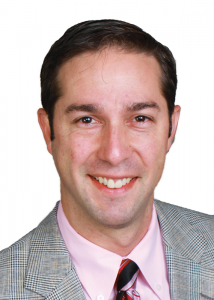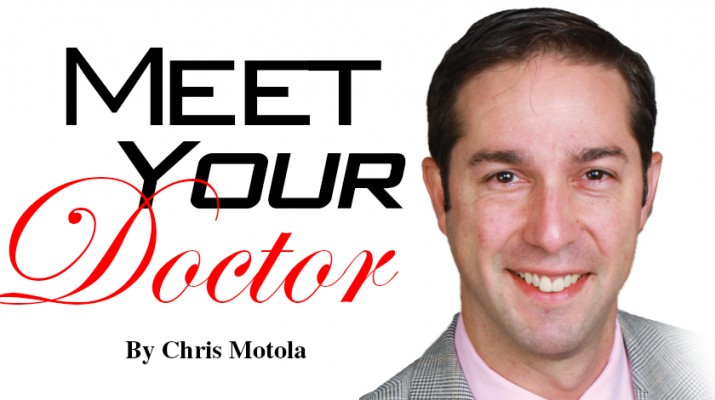New president of Monroe County Medical Society plans to create a wellness program for doctors: “At times, being a physician is very stressful,” he says
By Chris Motola
 Q: In your role as president of the Monroe County Medical Society, in what ways are you able to represent the local needs of both physicians and patients?
Q: In your role as president of the Monroe County Medical Society, in what ways are you able to represent the local needs of both physicians and patients?
A: I think the medical society really tries to help physicians run their practices and be an advocate for our patients. We communicate regularly with the state’s medical society, we work closely with the insurance companies. And we try to keep practitioners happy and look out for their well being.
Q: One of your goals is to create a physician wellness program. What is that?
A: We’re really working toward the program because physicians are kind of the last people to take care of themselves. At times, being a physician is very stressful. There are people who really need help getting through the difficult times. You can try to do everything you can for patients, but sometimes in spite of your best efforts, sometimes they don’t do well. It weighs on you. And it’s hard to find someone to talk about that. Wellness is a very important part of being an effective physician. There are so many ways you get pulled as a physician—between family duties, running a practice and managing people—it can get overwhelming. So, we’re looking at ways to help them deal with those issues productively.
Q: Are there some dysfunctions in physician culture? I’ve talked to medical interns who describe absurdly long shifts. I’m not sure I’d want someone that tired making my burger, much less operating on me. Why does that persist? And is it something that could or even should be fixed?
A: The difficult part about being a physician is that you’re not supposed to be wrong. As a surgeon, there’s very little room for error. With regard to surgical training, you get to be better when you do more surgery. I feel like, in my training, where I worked pretty awful hours, it made me a better surgeon. Now, there were times where it was depressing, where it was difficult to be in a hospital for a day and not get much of a break. But I think it’s how you cope with that that helps you get back to a good place again. I’m not sure telling physicians you’re only going to work eight hours a day is the best option unless it’s really quality time that they’re doing over those eight hours. Some of the most important lessons I learned were in the middle of the night when I was tired. While no one wants an exhausted physician working on them, it does teach you how to think on your feet. In some ways, the rigorous training is like what an athlete does. They’re constantly working themselves. But you do have to unwind. And physicians could be better at unwinding to some degree.
Q: How do you address this?
A: I think you can talk to people about how they relax. For instance, I’m a runner. I’m able to finish work, go home and go for a three-mile run and clear my head. Things like that are helpful. I think every person needs to find their activity that helps them take their mind off their office. They need time for themselves, and I don’t think we’re very good at that.
Q: How do you split the time between your duties?
A: I’m in full-time practice. The medical society takes up a manageable amount of time. We have meetings that I have to be at twice a month. I have email conversations daily or every other day about issues that come up. It’s not something that I feel cuts into my time in a way that I’m constantly thinking about it.
Q: How do you handle, organizationally, the political uncertainty around health care laws these days?
A: That’s a great question and a difficult problem, considering how quickly things have been changing. I try to stay focused on what we have today. There is uncertainty out there, but what we can do is work through the state medical society to give our opinion, as we hear it from our physicians, and relay what’s best for our patients.
Q: Is New York more insulated than other states given our regulatory environment?
A: I’m not sure if it’s more or less, honestly, not having a lot of experience outside of the state. We’re more regulated here, and that might make things more certain here, but I’m not sure I can accurately answer that.
Q: Tell us about your career and how you got involved with the medical society
A: Originally I trained as an electrical engineer, believe it or not. After not loving engineering as much as I thought I would, I ended up going into medicine. Following that, I really enjoyed doing hand surgery. Basically, what I do is hand and upper-extremity surgery as a sub-specialist. Several years ago, I was approached by the Monroe County Medical Society to be a volunteer on the board. I got involved and, as is often the case with volunteer organizations, I moved up the ladder little by little and was elected president this last year. It’s interesting to see how the community has changed over the past 10 – 15 years with regard to private practice versus employed physicians through our hospital system.
Q: How do you keep your hands in good working order?
A: In general, stay as active as possible. We encourage that as much as we can, especially considering how important your hands are. I find the patients that do best are the ones who, after surgery, are the ones who want to get better and are willing to really push themselves, even from serious injuries or arthritis. But you have to have that positive attitude about getting back to your regular activities.
Lifelines
Name: Peter J. Ronchetti, M.D.
Position: Clinical assistant professor at University of Rochester; president of Monroe County Medical Society; in private practice at Hand Surgery Associates of Rochester
Hometown: Shelburne, Vt.
Education: University of Vermont, medical school; internship in surgery-general at University of Rochester School of Medicine & Dentistry; residency in orthopedics at University of Rochester School of Medicine & Dentistry
Affiliations: Rochester Regional Health
Organizations: American Society of Surgery for the Hand, Monroe County Medical Society, Medical Society of the State of New York
Family: Married; three children
Hobbies: Running, golf

